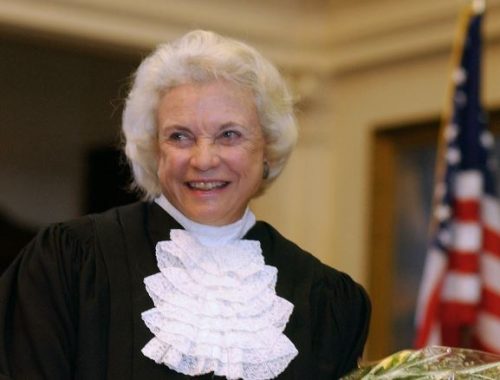Sandra Day O’Connor was born in El Paso, Texas on March 26, 1930. Her parents, Harry “D.A.” and Ada Mae “M.O.” Day, owned a cattle ranch in southeastern Arizona, the Lazy B, the largest and most successful ranch in the region. In the beginning, the remote ranch did not have electricity or running water. As a result, Sandra grew up becoming resourceful, including branding cattle and learning to fix whatever was broken, all the while enjoying life on the ranch.
The granddaughter of a pioneer who traveled west from Vermont and founded the family ranch some three decades before Arizona became a state, O’Connor had a tenacious, independent spirit that came naturally. As a child growing up in the remote outback, she learned early to ride horses, round up cattle and drive trucks and tractors.
“I didn’t do all the things the boys did,” she said in a 1981 Time magazine interview, “but I fixed windmills and repaired fences.”
After graduating from high school in 1946, she applied to Stanford University despite the probability that she might not be accepted because she was a woman. Competing against many other applicants, she was accepted.
After graduating from law school, O’Connor busily went about applying to law firms in San Francisco and Los Angeles, but because of the prejudices against women at that time, she could not get a job as a lawyer. She was offered a position as a legal secretary, which did not match her education and training. Instead, she took a position as a deputy county attorney in San Mateo, California, initially offering to work for no salary or office, and where she shared space with a secretary. During this time, she also married John O’Connor, who was one class behind her at Stanford. Upon his completion of law school, the couple moved to Germany, where he served as an attorney in the U.S. Army. She then worked as a civilian attorney, specializing in contracts.
Upon their return to the United States, the O’Connors settled in the Phoenix, Arizona, area. O’Connor and another lawyer opened a law office in suburban Maryvale; but for the next few years she devoted most of her time to raising her three sons, who were born between 1957 and 1962. She also joined many groups becoming a volunteer to improve her community, and where O’Connor began to take an active role in local politics.
O’Connor was appointed to the court in 1981 by President Ronald Reagan and served until her retirement in 2006. A moderate conservative, O’Connor was often the center of the court’s ideological spectrum, and she was the swing vote in a number of major decisions.

During the commencement speech she gave at Stanford in 2004, she reflected on her appointment by President Reagan:
“His decision was as much a surprise to me as it was to the nation as a whole. But Ronald Reagan knew that his decision wasn’t about Sandra Day O’Connor; it was about women everywhere. It was about a nation that was on its way to bridging a chasm between genders that had divided us for too long,” said O’Connor.
O’Connor was considered the deciding vote in a 2003 case that upheld affirmative action in college admissions, and she routinely upheld the Roe v. Wade decision that established a constitutional right to abortion, in one instance starting overturning Roe would deal “profound and unnecessary damage to the court’s legitimacy, and to the nation’s commitment to the rule of law.”
Thirty years after that decision, a more conservative court did overturn Roe and Casey, and the opinion was written by the man who took her high court seat, Justice Samuel Alito. He joined the court upon O’Connor’s retirement in 2006, chosen by President George W. Bush.
Chief Justice John Roberts mourned her death. “A daughter of the American Southwest, Sandra Day O’Connor blazed an historic trail as our Nation’s first female Justice,” Roberts said in statement issued by the court. “She met that challenge with undaunted determination, indisputable ability, and engaging candor.”
In 2018, she announced that she had been diagnosed with “the beginning stages of dementia, probably Alzheimer’s disease.” Her husband, John O’Connor, died of complications of Alzheimer’s in 2009.
Former President Barack Obama, who awarded O’Connor the Presidential Medal of Freedom in 2009, praised her for “forging a new path and building a bridge behind her for all young women to follow.”

“Justice O’Connor’s appointment was a pivotal moment in the history of the Supreme Court and the nation,” Justice Samuel Alito said at a public appearance in Washington Friday night. “She will always be remembered as one of the most important justices in the history of the Supreme Court.”
O’Connor died in Phoenix, of complications related to advanced dementia and a respiratory illness, the Supreme Court said in a news release. She was 93.
Molly K Ottman Executive Editor/Journalist for Mountain Daily Star

